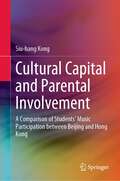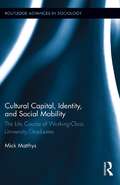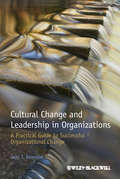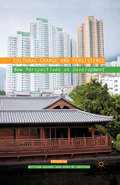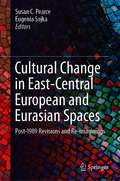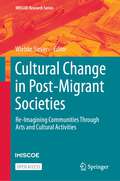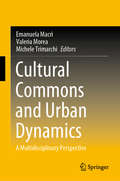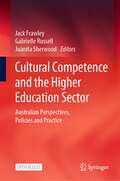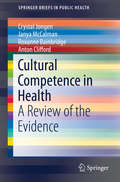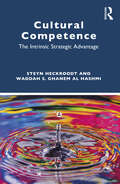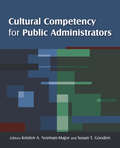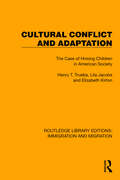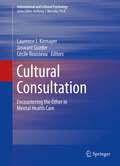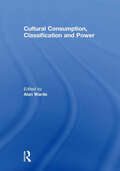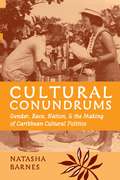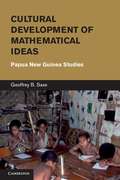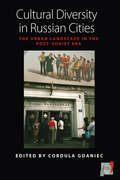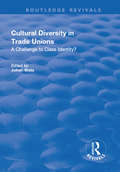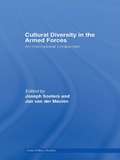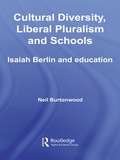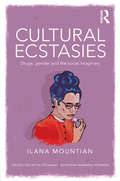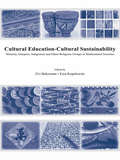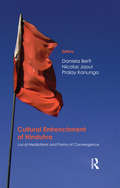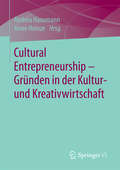- Table View
- List View
Cultural Capital and Parental Involvement: A Comparison of Students’ Music Participation between Beijing and Hong Kong
by Siu-hang KongThis book uses Pierre Bourdieu’s cultural capital model as a theoretical framework for exploring how students in Beijing and Hong Kong perceive parental influences—their parents’ cultural capital and support—on their participation in musical activities. By studying students’ perceptions of their parents’ cultural capital and support for their musical activities, this book revisits the applicability of Bourdieu’s cultural capital model in the contemporary Chinese context and reveals how inequality in terms of parental cultural capital governs parents’ support and influences the intergenerational transmission of cultural capital, which in turn contributes to inequality in terms of students’ cultural capital.
Cultural Capital, Identity, and Social Mobility: The Life Course of Working-Class University Graduates (Routledge Advances in Sociology #79)
by Mick MatthysThis qualitative study explores the meaning of working-class origin in the life and career of university graduates. Social transition from a working-class background to a middle-class milieu results in loyalty conflicts and communication barriers. The lack of social and cultural capital and the absent sense of an assertive self-presentation are pivotal barriers to gaining management functions. Positions in certain key sectors are not necessarily allocated according to professional capacity, but to obscure social connections, regulated by cultural codes and tests. Matthys approaches social mobility as a trajectory of identity construction in which different classes are integrated, and uses the notion of identity capital to interpret and discuss the meaning of the individual drive in social mobility.
Cultural Change and Leadership in Organizations
by Jaap J. BoonstraCultural Change and Leadership in Organizations discusses ways in which organizations are able to implement successful strategic change; inspirational and conceptual material is combined with practical examples and concrete interventions for planning and implementing cultural change within organizations. Cultural Change and Leadership in Organizations is targeted toward professionals, including organizational psychologists, consultants, senior managers, and human resources professionals, as well as advanced-level business school courses.
Cultural Change and Persistence: New Perspectives on Development
by William Ascher John M. HeffronThis book is about the ways that traditional cultural practices either change or persist in the face of social and economic development, whether the latter proceeds primarily from internal or external forces.
Cultural Change in East-Central European and Eurasian Spaces: Post-1989 Revisions and Re-imaginings
by Susan C. Pearce Eugenia SojkaThis book weaves together research on cultural change in Central Europe and Eurasia: notably, Bosnia and Herzegovina, Kazakhstan, Latvia, Poland, Russia, and Ukraine. Examining massive cultural shifts in erstwhile state-communist nations since 1989, the authors analyze how the region is moving in both freeing and restrictive directions. They map out these directions in such arenas as LGBTQ protest cultures, new Russian fiction, Polish memory of Jewish heritage, ethnic nationalisms, revival of minority cultures, and loss of state support for museums. From a comparison of gender constructions in 30 national constitutions to an exploration of a cross-national artistic collaborative, this insightful book illuminates how the region’s denizens are swimming in changing tides of transnational cultures, resulting in new hybridities and innovations. Arguing for a decolonization of the region and for the significance of culture, the book appeals to a wide, interdisciplinary readership interested in cultural change, post-communist societies, and globalization.
Cultural Change in Post-Migrant Societies: Re-Imagining Communities Through Arts and Cultural Activities (IMISCOE Research Series)
by Wiebke SieversThis open access book links the artistic and cultural turn in migration studies to the larger struggle for narrative and cultural change in European migration societies. It proposes theoretical and methodological approaches that highlight how ideas of change expressed in artistic and cultural practices spread and lead to wider cultural change. The book also looks at the slow processes of change in large cultural institutions that emerged at a time when culture was nationalised. It explains how individual and group activities can have an impact beyond their immediate surroundings. Finally, the book discusses how migration researchers have cooperated with arts and cultural producers and used artistic means to increase the effect of their research in the wider public. As such, the book provides a great resource for graduate students and researchers in the social sciences and the humanities who have an interest in migration studies and want to move beyond interpreting the world towards changing it.
Cultural Commons and Urban Dynamics: A Multidisciplinary Perspective
by Emanuela Macrì Valeria Morea Michele TrimarchiToday, cities are being intensively reshaped by unexpected dynamics. The rise and growth of the digital economy have fundamentally changed the relationship between the urban fabric and its resident community, overcoming the conventional hierarchy based on production priorities. Moreover, contemporary society discovers new labour conditions and ways of satisfying needs and desires by developing new synergies and links. This book examines cultural and urban commons from a multidisciplinary perspective. Economists, architects, urban planners, sociologists, designers, political scientists, and artists explore the impact and implications of cultural commons on urban change. The contributions discuss both cases of successful urban participation and cases of strong social conflict, while also addressing a host of institutional contradictions and dilemmas. The first part of the book examines urban commons in response to institutional constraints from a theoretical point of view. The second and third parts apply the theories to case studies and discuss various practices of sustainable planning and re-appropriation in the urban context. In closing, the fourth part develops a new urban agenda as artists imagine it. This book will appeal to scholars interested in the social, economic and institutional implications of cultural and urban commons, and provide useful insights and tools to help local governments and policymakers manage social, cultural and economic change.
Cultural Competence and the Higher Education Sector: Australian Perspectives, Policies and Practice
by Jack Frawley Gabrielle Russell Juanita SherwoodThis open access book explores cultural competence in the higher education sector from multi-disciplinary and inter-disciplinary perspectives. It addresses cultural competence in terms of leadership and the role of the higher education sector in cultural competence policy and practice. Drawing on lessons learned, current research and emerging evidence, the book examines various innovative approaches and strategies that incorporate Indigenous knowledge and practices into the development and implementation of cultural competence, and considers the most effective approaches for supporting cultural competence in the higher education sector. This book will appeal to researchers, scholars, policy-makers, practitioners and general readers interested in cultural competence policy and practice.
Cultural Competence in Health: A Review of the Evidence (SpringerBriefs in Public Health)
by Janya Mccalman Crystal Jongen Roxanne Bainbridge Anton CliffordThis resource supports evidence-informed approaches to improving the cultural competence of health service delivery. By reviewing the evidence from Australia, Canada, New Zealand and the US, it provides readers with a clear and systematic overview of the interventions and indicators applied to enable health system agencies and professionals to work effectively in various cross-cultural health care situations. The book highlights the importance of cultural competence and describes the current situation in the studied countries; identifies effective approaches and strategies for improving the situation; reviews the indicators for measuring progress; assesses the health outcomes associated with cultural competence; summarizes the quality of the evidence; and presents an evidence-informed conceptual framework for cultural competence in health. Cultural competence is critical to reducing health disparities and has become a popular concept in these countries for improving access to high-quality, respectful and responsive health care. This book provides policy makers, health practitioners, researchers and students with a much needed summary of what works to improve health systems, services and practice.
Cultural Competence: The Intrinsic Strategic Advantage
by Waddah S. Ghanem Al Hashmi Steyn HeckroodtTaking a strategic imperative perspective, this book introduces business leaders to a key differentiator that contributes to competitive advantage and financial sustainability: cultural competence. In a fast-changing and globalized world where organizations are being forced to rethink their strategies, understanding present and future environmental, social, and economic challenges is fundamental to creating a resilient and value-creating business. Combining experience and reflection, this book addresses concepts of organizational cultural competence as an internal differentiator and source of competitive advantage. Most organizations approach differentiation as an external feature of product and/or service delivery. Whereas these are open to imitation, cultural competence, as the internal DNA of an organization, is much more difficult, if not impossible, to imitate. The authors bring to bear their years of experience in corporate roles and as entrepreneurs and academics, sharing views and experiences based on research but also on primary examples, meta-insights, and real-world case studies. Senior leaders and consultants across industries, as well as students of strategy and leadership development, will value this serious and comprehensive guide that explains the importance of cultural competence as a strategic advantage in a global market.
Cultural Competency for Public Administrators
by Susan T Gooden Kristen A. Norman-MajorWith a focus on a broad spectrum of topics--race, ethnicity, gender, disability, and sexual orientation at the federal, tribal, state, and local levels--this book equips readers to better understand the complex, real-world challenges public administrators confront in serving an increasingly diverse society.The book's main themes include: What is cultural competency and why is it important? Building culturally competent public agencies; Culturally competent public policy; Building culturally competent public servants; How do agencies assess their cultural competency and what is enough? PA scholars will appreciate the attention given to the role of cultural competency in program accreditation, and to educational approaches to deliver essential instruction on this important topic. Practitioners will value the array of examples that reflect many of the common trade offs public administrators face when trying to deliver comprehensive programs and services within a context of fiscal realities.
Cultural Competency for Public Administrators (4x45)
by Susan T Gooden Kristen A. Norman-MajorWith a focus on a broad spectrum of topics--race, ethnicity, gender, disability, and sexual orientation at the federal, tribal, state, and local levels--this book equips readers to better understand the complex, real-world challenges public administrators confront in serving an increasingly diverse society. The book's main themes include: What is cultural competency and why is it important? Building culturally competent public agencies; Culturally competent public policy; Building culturally competent public servants; How do agencies assess their cultural competency and what is enough? PA scholars will appreciate the attention given to the role of cultural competency in program accreditation, and to educational approaches to deliver essential instruction on this important topic. Practitioners will value the array of examples that reflect many of the common trade offs public administrators face when trying to deliver comprehensive programs and services within a context of fiscal realities.
Cultural Conflict and Adaptation: The Case of Hmong Children in American Society (Routledge Library Editions: Immigration and Migration #7)
by Henry T. Trueba Lila Jacobs Elizabeth KirtonCultural Conflict and Adaptation (1990) examines the alienation and cultural conflicts faced at school by the children of a small group of Hmong who have settled in La Playa, California. The educational process for these children is an example of cultural conflict and adjustment patterns which may be found in many other populations in the world.
Cultural Consultation: Encountering the Other in Mental Health Care (International and Cultural Psychology)
by Laurence J. Kirmayer Jaswant Guzder Cécile RousseauBased on a recently completed project of cultural consultation in Montreal, Cultural Consultation presents a model of multicultural and applicable health care. This model used clinicians and consultants to provide in-depth assessment, treatment planning, and limited interventions in consultation with frontline primary care and mental health practitioners working with immigrants, refugees, and members of indigenous and ethnocultural communities. Evaluation of the service has demonstrated that focused interventions by consultants familiar with patients' cultural backgrounds could improve the relationship between the patient and the primary clinician. This volume presents models for intercultural work in psychiatry and psychology in primary care, general hospital and specialty mental health settings. The editors highlight crucial topics such as: - Discussing the social context of intercultural mental health care, conceptual models of the role of culture in psychopathology and healing, and the development of a cultural consultation service and a specialized cultural psychiatric service - Examining the process of intercultural work more closely with particular emphasis oto strategies of consultation, the identity of the clinician, the ways in which gender and culture position the clinician, and and interaction of the consultant with family systems and larger institutions - Highlighting special situations that may place specific demands on the clinician: working with refugees and survivors of torture or political violence, with separated families, and with patients with psychotic episodes This book is of valuable use to mental health practitioners who are working in multidisciplinary settings who seek to understand cultural difference in complex cases. Psychiatrists, psychologists, social workers, nurse practitioners, primary care providers and trainees in these disciplines will make thorough use of the material covered in this text.
Cultural Consumption, Classification and Power
by Alan WardeWhen social scientists in the 1970s began to identify the positive and constructive role of cultural practices in the operation of power, Pierre Bourdieu advanced a highly influential and subsequently controversial account. Most notably in Distinction, he charted the connections between cultural taste and practice and social classification. This book seeks to evaluate, develop and transcend the ideas that Bourdieu explored in Distinction.. Taken together the papers compare and contrast different theoretical and conceptual approaches, bring empirical investigations to bear on relevant theoretical issues, drawing on different national experiences (France, UK, Canada, Central Africa), and attend to aspects of the relationship between culture and power with reference to gender and ethnicity as well as class. Thus the book contributes to the on-going international debates across the social sciences about Bourdieu’s legacy and the current role of cultural practice in social reproduction.
Cultural Conundrums
by Natasha BarnesCultural Conundrums investigates the passions of race, gender, and national identity that make culture a continually embattled public sphere in the Anglophone Caribbean today. Academics, journalists, and ordinary citizens have weighed in on the ideological meanings to be found in the minutiae of cultural life, from the use of skin-bleaching agents in the beauty rituals of working-class Jamaican women to the rise of sexually suggestive costumes in Trinidad’s Carnival.
Cultural Development of Mathematical Ideas
by Geoffrey B. Saxe Indigo EsmondeDrawing upon field studies conducted in 1978, 1980, and 2001 with the Oksapmin, a remote Papua New Guinea group, Geoffrey B. Saxe traces the emergence of new forms of numerical representations and ideas in the social history of the community. In traditional life, the Oksapmin used a counting system that makes use of twenty-seven parts of the body; there is no evidence that the group used arithmetic in prehistory. As practices of economic exchange and schooling have shifted, children and adults unwittingly reproduced and altered the system in order to solve new kinds of numerical and arithmetical problems, a process that has led to new forms of collective representations in the community. While Dr. Saxe's focus is on the Oksapmin, the insights and general framework he provides are useful for understanding shifting representational forms and emerging cognitive functions in any human community.
Cultural Diversity In Russian Cities
by Cordula GdaniecCultural diversity -- the multitude of different lifestyles that are not necessarily based on ethnic culture -- is a catchphrase increasingly used in place of multiculturalism and in conjunction with globalization. Even though it is often used as a slogan it does capture a widespread phenomenon that cities must contend with in dealing with their increasingly diverse populations. The contributors examine how Russian cities are responding and through case studies from Moscow, St. Petersburg, Novosibirsk, and Sochi explore the ways in which different cultures are inscribed into urban spaces, when and where they are present in public space, and where and how they carve out their private spaces. Through its unique exploration of the Russian example, this volume addresses the implications of the fragmented urban landscape on cultural practices and discourses, ethnicity, lifestyles and subcultures, and economic practices, and in doing so provides important insights applicable to a global context.
Cultural Diversity in Trade Unions: A Challenge to Class Identity? (Routledge Revivals Ser.)
by Johan WetsThis title was first published in 2000: Addresses the question of how encompassing unions deal with regional differences and competing cultural identities - in particular those of migrant workers as a specific social and cultural category. Are regional and cultural differences jeopardizing the working-class solidarity?
Cultural Diversity in the Armed Forces: An International Comparison (Cass Military Studies)
by Joseph Soeters Jan van der MeulenThis volume explores ethnicity and gender developments in relation to the military. In some countries, the armed forces have a long history in responding to ethnic diversity, while elsewhere it has come up only recently as a policy issue. An even-handed representation of ethnic minorities in the military is recognized as crucial for enhancing its social legitimacy and professional quality. The same can be said about the integration of women in the military, which during a few decades across the board has grown into more than just another issue of personnel policies. Indeed with regard to gender, the symbolism and sensitivities surrounding core identities are at stake – as with the presence of gays and lesbians in the military. Written by experts in the field, the chapters cover fourteen countries around the world: the USA, Canada, Bolivia, Ecuador, Brazil, South-Africa, Eritrea, India, Israel, Great Britain, France, Germany, Belgium and The Netherlands. Taken together, the armed forces of these countries offer a fascinating mix of similarities and differences in the ways they try to manage cultural diversity. Cultural Diversity in the Armed Forces will be of interest to students and scholars of military studies, sociology, gender and political science.
Cultural Diversity, Liberal Pluralism and Schools: Isaiah Berlin and Education (Routledge International Studies in the Philosophy of Education #Vol. 17)
by Neil BurtonwoodWith debates on the relationship between cultural diversity and the role of schools raging on both sides of the Atlantic, the time is apt for a philosophical work that shines new light on the issues involved and that brings a fresh perspective to a political and emotive discussion. Here Burtonwood brings the writing of British philosopher Isaiah Berlin to bear on the subject of multiculturalism in schools, the first time that his work has been applied to matters of education. Tackling the often-contradictory issues surrounding liberal pluralism, this book poses serious questions for the education system in the US and in the UK.
Cultural Ecstasies: Drugs, Gender and the Social Imaginary (Concepts for Critical Psychology)
by Ilana MountianIn this important contribution to the field, Ilana Mountian critically analyses discourses surrounding drug addiction, drug prohibition, treatment and prevention, and highlights new ways of understanding the role that gender plays in the ethics of drug use across cultures. The book analyses the discourses of religion, criminality and medicine, and shows how they, combined with key historical events, affect our views of drug use and drug users based on gender, race and class. The book draws on research from a variety of fields to provide alternative conceptual and methodological perspectives on the subject, including: critical theory gender studies post-colonial studies psychoanalysis philosophy. Cultural Ecstasies is an innovative study of drugs and addiction, and will be of great interest to students, researchers and professionals working in psychology, sociology, social work, health care, criminology, and allied disciplines.
Cultural Education - Cultural Sustainability: Minority, Diaspora, Indigenous and Ethno-Religious Groups in Multicultural Societies
by Zvi Bekerman Ezra KopelowitzThis volume is a path-breaking contribution to the study of efforts of diaspora, indigenous, and minority groups, broadly defined, to use education (formal and informal) to sustain cultural continuity while grappling with the influences and demands of wider globalizing, nationalizing, or other homogenizing and assimilatory forces. Particular attention is given to groups that use educational elements other than second-language teaching alone in programs to sustain their particular cultural traditions. The focus of the book on cultural sustainability changes the nature of questions posed in multicultural education from those that address the opening of boundaries to issues of preserving boundaries in an open yet sustainable way. As forced and elective immigration trends are changing the composition of societies and the educational systems within them -- bringing a rich diversity of cultural experience to the teaching/learning process -- diaspora, indigenous, and minority groups are looking more and more for ways to sustain their cultures in the context of wider socio-political influences. This volume is a first opportunity to consider critically multicultural efforts in dialogue with educational options that are culturally particularistic but at the same time tolerant. Academics will find this an excellent reference book. Practitioners will draw inspiration in learning of others’ efforts to sustain cultures, and will engage in critical reflection on their own work vis-à-vis that of others. Teachers will realize they do not stand alone in their educational efforts and will uncover new strategies and methodologies through which to approach their work.
Cultural Entrenchment of Hindutva: Local Mediations and Forms of Convergence
by Daniela BertiThe book reflects on the discreet influence of Hindutva in situations/places outside or at the margins of its organisational and mobilisational arena, where people denying any commitment to the Sangh Parivar, incidentally, show affinities and parallelisms with its discourse and practice. This study looks at Hindutva’s entrenchment not so much as an orchestration from above but more as an outcome of a process that evolves in relation to specific social and cultural milieus.The contributors analyse Hindutva’s entrenchment, emphasising on the ethnography of the forms of mediation and/or convergence produced in certain contexts. The 11 case studies highlight three different dynamics of Hindutva’s cultural entrenchment. The first section gathers cases where RSS-affiliated organisations have set up specific cultural or artistic programmes at the regional level, involving the meditation of local people whose interest in these programmes does not necessarily mean that they endorse the Hindutva agenda completely. The next deals with convergence and refers to cases where the followers gather around a charismatic personality, whose precepts and practice may bring them towards a closer affinity with the Hindutva programme. The last section deals with the contexts of resistance, where social milieus engaged in opposing Hindutva may, in fact, paradoxically, and even inadvertently, imbibe some of its ideas and practices in order to contest its claims.
Cultural Entrepreneurship - Gründen in der Kultur- und Kreativwirtschaft
by Andrea Hausmann Anne HeinzeDer vorliegende Sammelband hat das Ziel, die Besonderheiten von Gründungen in der Kultur- und Kreativwirtschaft auszuloten und Maßnahmen und Lösungsansätze im Hinblick auf Finanzierung, Förderung, Marketing und Netzwerkmanagement vorzustellen. Renommierte Experten aus Wissenschaft und Praxis beleuchten Chancen und Risiken für Gründungen in der Kultur- und Kreativwirtschaft. Best-Practice-Beispiele und Tipps für erfolgreiche Gründungen runden die Inhalte des Sammelbandes ab.
